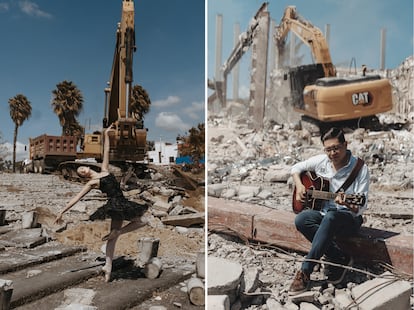Artists, environmental activists and social organizations oppose the project of Governor Miguel Ángel Navarro

A dancer with a delicate black tutu runs ballet movements in the midst of destruction. The girl moves with grace and elegance while behind her an excavator Caterpillar unblusts with her sharp metal teeth a concrete structure. The machine moves constant on a pile of debris while the dancer raises her arms to heaven in a last attempt to denounce to prevent the city of the arts, a cultural complex in Tepic, the capital of the state of Nayarit, to the west of Mexico. The workers advance to a powerful march to clear the area, where until recently there was an amphitheater. Its mission is to allow the basis for the construction of a football stadium promoted by Governor Miguel Ángel Navarro, a member of the official Morena.
The intervention of the dancer is one of the initiatives that collective artists, environmental activists and social organizations promote to denounce the destruction of the cultural complex, built more than a decade ago and where more than 500 million pesos of public money have been invested. The so -called City of Arts had the amphitheater, libraries, music schools and exhibition spaces until recently, where painting, oratory and sculpture workshops were also taught. There are areas for sport and wooded areas. “It is not just a demolition: it is a legal, environmental and social regression. Public and cultural goods are being destroyed without legal support,” says Carlos Lara, a specialist in cultural rights and representative of the legal office article 27, which will present on Monday an amparo to stop the demolition.
Lara, in an interview with this newspaper by video call, explains that the stadium project has not been consulted with the Tepic City Council and is promoted by “by its guns” by Governor Navarro. This newspaper requested information from Rocío González García, general secretary of the state government, but did not respond. Also to Yannick Alonso Cruz, of institutional relationship of the State, who promised to make arrangements to talk with the governor, but until Friday night there was no response.
Environmental activist Isaac Cárdenas explains that the construction of the new stadium will imply the destruction of the park near the cultural complex. The Nayarit authorities have reported in a statement that guarantee the “safe” relocation of about 200 trees “as part of the ecological commitment of the project”, which will be named after Nicolás Álvarez Ortega, a renowned state athlete. “Telling the citizens that these trees are not going to dry, we will not let them die,” said the director of the Nayarit Forest Commission, Gabriela Arias Saldaña, in an official statement. “When the stadium is we are going to make a mega reforestation of trees,” he promised.
Activist in Nayarit
n “}},”video_agency”:false,”alt_image”:”Activista en Nayarit “},”url”:”https://imagenes.elpais.com/resizer/v2/RJSDJFK3NZANTM25LOOEIHOPAI.jpg?auth=d8e7cc35c045d120ccc764052b7e346f18766d607e5e5f9371413291af05840d&width=1200&height=675&smart=true”,”alt”:”Activista en Nayarit “,”ogWidth”:16,”ogHeight”:9});
The new stadium project began in 2009, but did not advance due to financial problems. It was the Governor Navarro who resumed the work and last May, in an official ceremony, the construction began. The new structure will have the capacity for 12,600 people, will have commercial spaces and the authorities have promised that in its basement it will house the State School of Fine Arts, which is still in the city of the Arts. The current Government considers that the old complex is a “failed work”, built under the mandate of Governor Roberto Sandoval Castañeda, of the Institutional Revolution Party (PRI), who was arrested and accused by the Attorney General of the Republic (FGR) of the crime of “operations with resources of illegal origin” and that he was at least three months fugitive from justice, in 2021. Former governor as his daughter, Lidy Alejandra, also detained, had made an “excessive” amount of operations “to the economic detriment of Nayarit’s public finances.”
“The city of the Arts was executed two six -year years ago with the idea of making it the cultural tip within Nayarit. A very large investment was made, with a music room, a cultural forum and also has the Park of Dignity, named by the social struggles to preserve these spaces. We have been taking care of and reforesting those areas for ten years,” explains the activist Cárdenas. The local Congress, he says, has declared the complex as a state cultural zone. For Cárdenas, the new stadium is a “political revenge” of the current governor against the previous administration.
Lissette Álvarez Cazola, cultural manager of Tepic, denounces that the authorities have also taken out the students of the School of Music to start their demolition. “There are a number of requirements that have to present, among them a permit by the City Council, because no work can be done if you do not have that permission. The population surrounding the complex has not been consulted or informed of what will be built or how this will change their lives. There are shops that pay taxes and have been there for years and they have already closed them. It is an atrocity after another Álvarez complaint.
The organizations gathered to avoid the demolition of the complex will present on Monday an amparo before justice to denounce what they consider the violation of the right of access to culture. In addition, they will ask the authorities with the immediate suspension of the works, the restitution of the demolished cultural spaces and that the Supreme Court of Justice of the Nation discusses this case. “There is a legitimate interest of society, because there are people who have stopped attending classes, affects access to culture and the exercise of cultural rights and also threatens the cultural policy of the current government, which emphasizes artistic education for all,” explains lawyer Lara, of the legal office article 27, which has participated in emblematic cases, such as legal actions against the controversial Maya train.

Activists expect that there is a national echo to attract the interest of the federal government, that last fall inaugurated, with the participation of President Claudia Sheinbaum, the City of Indigenous Arts, in the center of Tepic, “designed to promote the formation, production, exhibition and teaching of the art of indigenous communities and as a center for artistic and cultural development and projection”, according to the official information. The work had a cost of 498 million pesos and 32,321 square meters of land were intervened. The activists, who do not oppose this project, affirm that both complexes can be active in Nayarit. “The City of Arts can and should recover for culture. Not for cement. Not for business. This fight is for the present and future of Nayarit,” they said.
Your subscription is being used on another device
Do you want to add another user to your subscription?
If you continue reading on this device, you cannot read in the other.
Why are you seeing this?
Arrow
Your subscription is being used on another device and you can only access El País from one device at the same time.
If you want to share your account, change your subscription to the premium mode, so you can add another user. Each will access with their own email account, which will allow you to customize your experience in the country.
Do you have a company subscription? Access here to hire more accounts.
In the case of not knowing who is using your account, we recommend changing your password here.
If you decide to continue sharing your account, this message will be shown on your device and in the other person who is using your account indefinitely, affecting your reading experience. You can consult here the terms and conditions of the digital subscription.
About the firm

Editor of the America El País Edition. For eleven years he was in charge of the coverage of Nicaragua, from Managua. Now, in the wording of Mexico City, it covers the news of Central America and education and environmental issues.
More information



